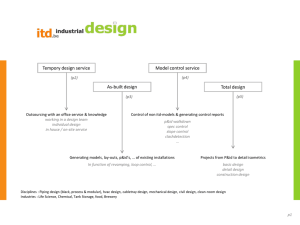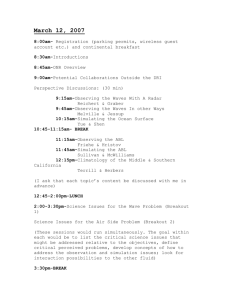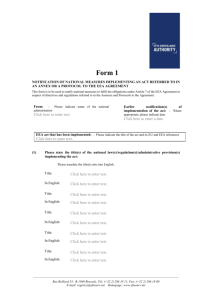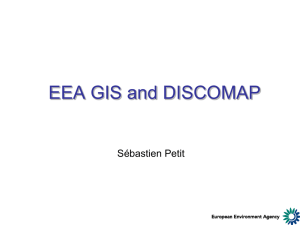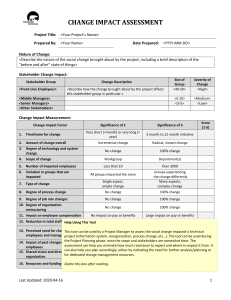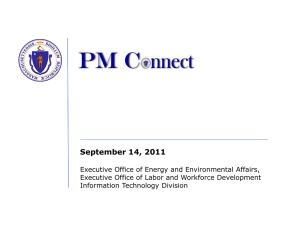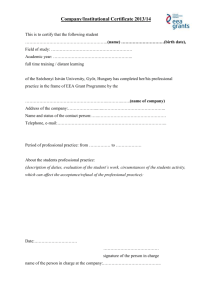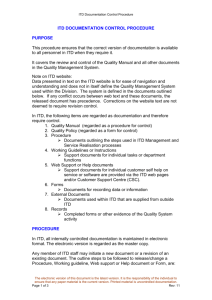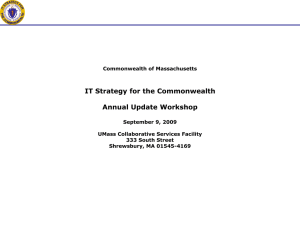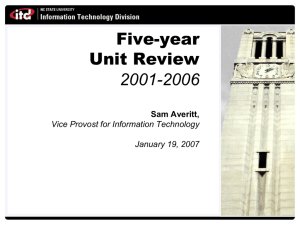1 Breakout Session Group summary
advertisement
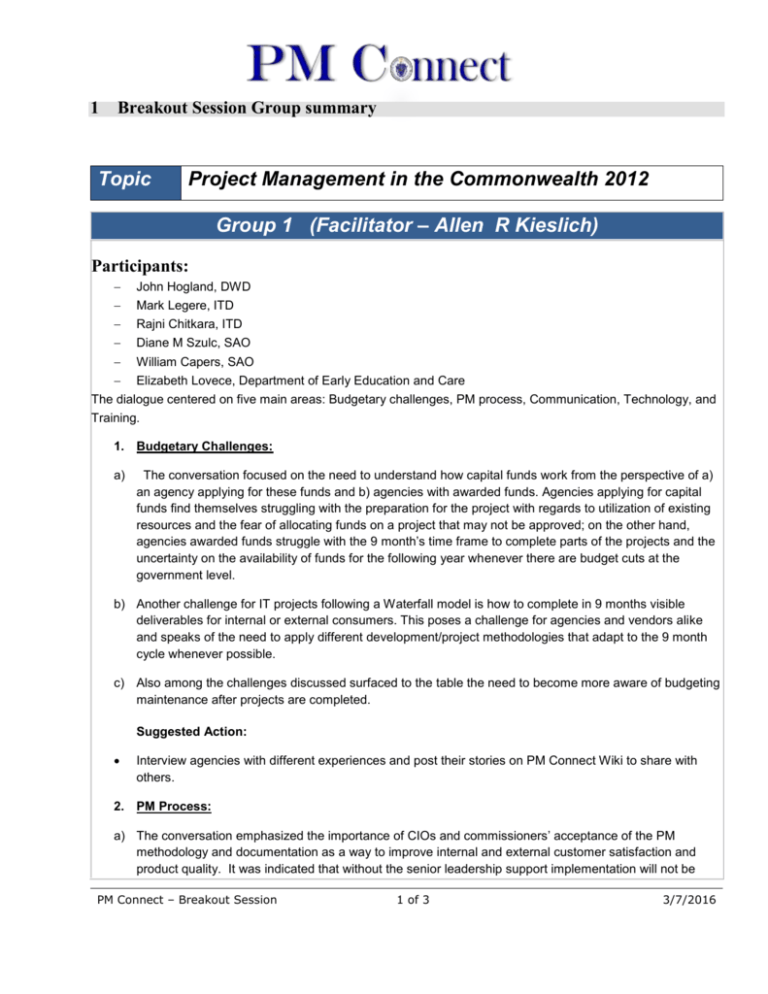
1 Breakout Session Group summary Topic Project Management in the Commonwealth 2012 Group 1 (Facilitator – Allen R Kieslich) Participants: John Hogland, DWD Mark Legere, ITD Rajni Chitkara, ITD Diane M Szulc, SAO William Capers, SAO Elizabeth Lovece, Department of Early Education and Care The dialogue centered on five main areas: Budgetary challenges, PM process, Communication, Technology, and Training. 1. Budgetary Challenges: a) The conversation focused on the need to understand how capital funds work from the perspective of a) an agency applying for these funds and b) agencies with awarded funds. Agencies applying for capital funds find themselves struggling with the preparation for the project with regards to utilization of existing resources and the fear of allocating funds on a project that may not be approved; on the other hand, agencies awarded funds struggle with the 9 month’s time frame to complete parts of the projects and the uncertainty on the availability of funds for the following year whenever there are budget cuts at the government level. b) Another challenge for IT projects following a Waterfall model is how to complete in 9 months visible deliverables for internal or external consumers. This poses a challenge for agencies and vendors alike and speaks of the need to apply different development/project methodologies that adapt to the 9 month cycle whenever possible. c) Also among the challenges discussed surfaced to the table the need to become more aware of budgeting maintenance after projects are completed. Suggested Action: Interview agencies with different experiences and post their stories on PM Connect Wiki to share with others. 2. PM Process: a) The conversation emphasized the importance of CIOs and commissioners’ acceptance of the PM methodology and documentation as a way to improve internal and external customer satisfaction and product quality. It was indicated that without the senior leadership support implementation will not be PM Connect – Breakout Session 1 of 3 3/7/2016 Group 1 (Facilitator – Allen R Kieslich) successful. b) Another aspect of the process that has been observed is the need to engage the right people at a very early stage of a project. Some of the participants spoke of their experience finding that at the time of the PM being assigned there was still considerable lack of understanding of the parts and the sum of the project. Suggested Actions: PM Connect could create sessions for senior leaders depicting the benefits of PM methodology. Teams need to involve the right people on the projects at a very early stage. Share experiences and solutions. 3. Communication: Participants stated the importance of engaging people in verbal and written communication as well as maintaining documentation up-to-date to avoid misinterpretations and unnecessary conflicts. Suggested Actions: Market the Commonwealth methodology to agencies, commissioners, CIOs at the secretariat and departments. Focus on benefits on communication, product quality and time reducing bugs and misunderstandings Invite CIOs to share their experiences with the commonwealth methodology Promote use of the commonwealth templates by internal staff, contract vendors and enforce their use on vendors funded by capital funds Invite feedback on the forms as part of a continuous improvement process 4. Technology: Publicize the technology platforms ITD is and plans to support in the future to avoid investing on technologies that will become extinct. PMs need to make clients aware of planning who will support the projects after deliverables and the operational cost as part of maintenance. 5. Training: Support and encourage training via Learn IT. Consider including training as part of the budget for the staff that will be supporting a project after deliverable. Suggested Actions: Create a PM certification via LearnIT Work with senior and middle management at different agencies to promote professional development, particularly the commonwealth methodology at IT units In summary, 2012 requires PMs to continuously reinforce accountability and responsibility. Also, practice being good communicators, flexible and adaptable. Change is the only constant in this fast pace technological environment. PM Connect – Breakout Session 2 of 3 3/7/2016 Group 3 (Facilitator – Alexis Shaw) Our Group consisted of the following individuals: Alexis Shaw (ITD) – PMO Contractor, and Group Moderator Mike Blade (ITD) – PMO Contractor Helen O’Malley (ANF) – Project Manager Venkat Busanelli (DOR) – Project Manager John Beveridge (SAO) – State Auditor’s Office Jon Geer (EEA) – Secretariat CIO, Executive Office of Energy and Environmental Affairs Tom Skinner (EEA) – Director, EEA PMO Eric Aftandilian (EEA) – Quality Assurance The topic was discussed at a general/high level rather than detail level. The main thrust of the discussion was the importance of instituting and following an established common process such as ITD’s “Common Way” for managing projects across Secretariats (and their Agencies). Following are the important points that were brought up by the participants at the session, and each point had a discussion surrounding it (all in favor): Have a Common Way roundtable for non-Capital Projects also. Common Way and its Guidelines should be integrated in all projects. Monitoring and Evaluation should be integrated in every step of the Project. It is critical to adopt a framework with deadlines, and show results, and have accountability in projects. There should be organized approach, and follow-through in projects. There should be a standard way of tracking everything (a standard traceability matrix or methodology). Many of the documentation that some PMOs have can be shared, thus eliminating redundancies, and creating the wheel again! We know that ITD, DOR, and EEA have a PMO. Should each Secretariat have one? Establish dialog/roundtable among Secretariat’s PMOs and compare notes on how they do things in establishing a culture of success. Establish cross Agency collaboration by sharing, and leveraging lessons learned from both successes, and failures. Educate Senior Managers/Client Agencies in the importance of having a PMO, and PMPs. Educate Senior Managers/Client Agencies in the nomenclature, and strategies of Project Management, and their far reaching effects beyond IT. After discussing the importance of above points, and listening to other Groups, it became evident that the same points have been discussed, and mentioned in one way or another by every Group during the breakout sessions in the past couple of PM Connect meetings also! Therefore the next step should be to come up with an Action Plan and start implementing them rather than reiterate the same [cliché] points at the upcoming PM Meeting! PM Connect – Breakout Session 3 of 3 3/7/2016

